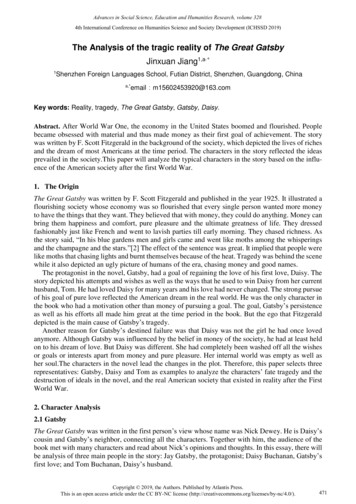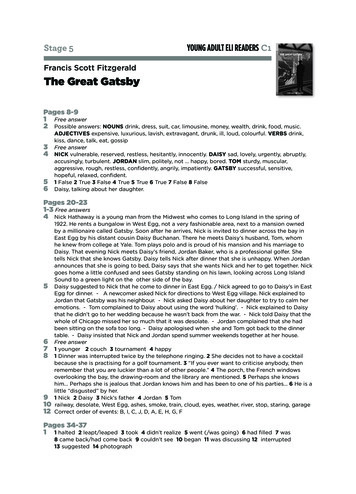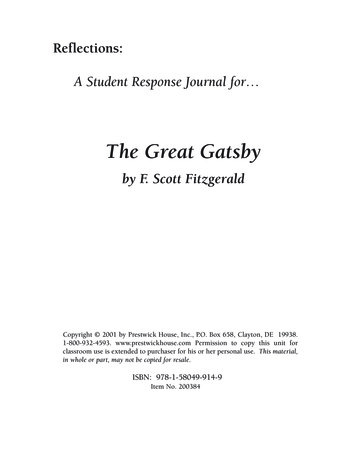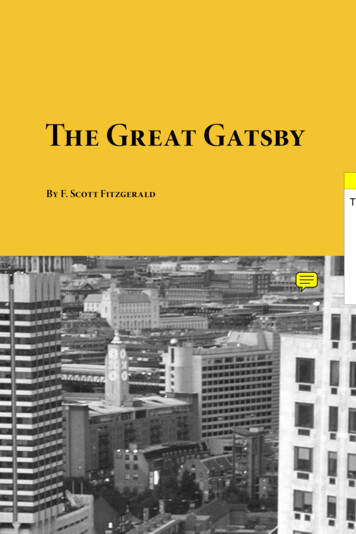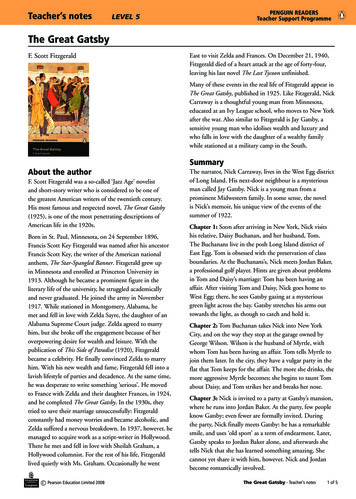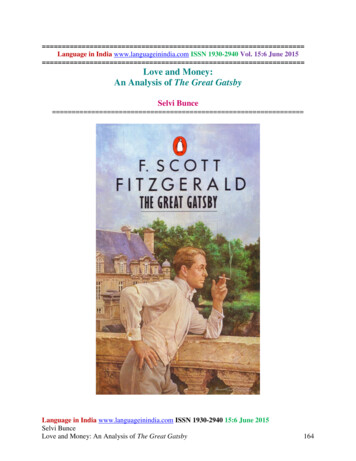
Transcription
The Great GatsbyFitzgerald, Francis ScottPublished: 1925Categorie(s): Fiction, Literary, RomanceSource: http://ebooks.adelaide.edu.au/1
About Fitzgerald:Francis Scott Key Fitzgerald (September 24, 1896 – December 21, 1940) was an American Jazz Age author of novels andshort stories. He is regarded as one of the greatest twentiethcentury writers. Fitzgerald was of the self-styled "Lost Generation," Americans born in the 1890s who came of age duringWorld War I. He finished four novels, left a fifth unfinished,and wrote dozens of short stories that treat themes of youth,despair, and age.Also available on Feedbooks for Fitzgerald:The Curious Case of Benjamin Button (1922)The Great Gatsby (1925)Tender is the Night (1933)The Beautiful and the Damned (1922)This Side of Paradise (1920)"I Didn't Get Over" (1936)The Rich Boy (1926)Jacob's Ladder (1927)"The Sensible Thing" (1924)Bernice Bobs Her Hair (1920)Copyright: This work is available for countries where copyright is Life 70.Note: This book is brought to you by Feedbookshttp://www.feedbooks.comStrictly for personal use, do not use this file for commercialpurposes.2
Then wear the gold hat, if that will move her;If you can bounce high, bounce for her too,Till she cry "Lover, gold-hatted, high-bouncing lover,I must have you!"—THOMAS PARKE D'INVILLIERS3
Chapter1In my younger and more vulnerable years my father gaveme some advice that I’ve been turning over in my mind eversince.“Whenever you feel like criticizing any one,” he told me, “justremember that all the people in this world haven’t had the advantages that you’ve had.”He didn’t say any more, but we’ve always been unusuallycommunicative in a reserved way, and I understood that hemeant a great deal more than that. In consequence, I’m inclined to reserve all judgments, a habit that has opened upmany curious natures to me and also made me the victim of nota few veteran bores. The abnormal mind is quick to detect andattach itself to this quality when it appears in a normal person,and so it came about that in college I was unjustly accused ofbeing a politician, because I was privy to the secret griefs ofwild, unknown men. Most of the confidences were unsought —frequently I have feigned sleep, preoccupation, or a hostile levity when I realized by some unmistakable sign that an intimaterevelation was quivering on the horizon; for the intimate revelations of young men, or at least the terms in which they express them, are usually plagiaristic and marred by obvious suppressions. Reserving judgments is a matter of infinite hope. Iam still a little afraid of missing something if I forget that, asmy father snobbishly suggested, and I snobbishly repeat, asense of the fundamental decencies is parcelled out unequallyat birth.And, after boasting this way of my tolerance, I come to theadmission that it has a limit. Conduct may be founded on thehard rock or the wet marshes, but after a certain point I don’tcare what it’s founded on. When I came back from the East lastautumn I felt that I wanted the world to be in uniform and at asort of moral attention forever; I wanted no more riotous4
excursions with privileged glimpses into the human heart. OnlyGatsby, the man who gives his name to this book, was exemptfrom my reaction — Gatsby, who represented everything forwhich I have an unaffected scorn. If personality is an unbrokenseries of successful gestures, then there was something gorgeous about him, some heightened sensitivity to the promisesof life, as if he were related to one of those intricate machinesthat register earthquakes ten thousand miles away. This responsiveness had nothing to do with that flabby impressionability which is dignified under the name of the “creative temperament.”— it was an extraordinary gift for hope, a romanticreadiness such as I have never found in any other person andwhich it is not likely I shall ever find again. No — Gatsbyturned out all right at the end; it is what preyed on Gatsby,what foul dust floated in the wake of his dreams that temporarily closed out my interest in the abortive sorrows and shortwinded elations of men.My family have been prominent, well-to-do people in thisMiddle Western city for three generations. The Carraways aresomething of a clan, and we have a tradition that we’re descended from the Dukes of Buccleuch, but the actual founder of myline was my grandfather’s brother, who came here in fifty-one,sent a substitute to the Civil War, and started the wholesalehardware business that my father carries on to-day.I never saw this great-uncle, but I’m supposed to look likehim — with special reference to the rather hard-boiled paintingthat hangs in father’s office I graduated from New Haven in1915, just a quarter of a century after my father, and a littlelater I participated in that delayed Teutonic migration knownas the Great War. I enjoyed the counter-raid so thoroughly thatI came back restless. Instead of being the warm centre of theworld, the Middle West now seemed like the ragged edge ofthe universe — so I decided to go East and learn the bond business. Everybody I knew was in the bond business, so I supposed it could support one more single man. All my aunts anduncles talked it over as if they were choosing a prep school forme, and finally said, “Why — ye — es,” with very grave, hesitant faces. Father agreed to finance me for a year, and aftervarious delays I came East, permanently, I thought, in thespring of twenty-two.5
The practical thing was to find rooms in the city, but it was awarm season, and I had just left a country of wide lawns andfriendly trees, so when a young man at the office suggestedthat we take a house together in a commuting town, it soundedlike a great idea. He found the house, a weather-beaten cardboard bungalow at eighty a month, but at the last minute thefirm ordered him to Washington, and I went out to the countryalone. I had a dog — at least I had him for a few days until heran away — and an old Dodge and a Finnish woman, who mademy bed and cooked breakfast and muttered Finnish wisdom toherself over the electric stove.It was lonely for a day or so until one morning some man,more recently arrived than I, stopped me on the road.“How do you get to West Egg village?” he asked helplessly.I told him. And as I walked on I was lonely no longer. I was aguide, a pathfinder, an original settler. He had casually conferred on me the freedom of the neighborhood.And so with the sunshine and the great bursts of leavesgrowing on the trees, just as things grow in fast movies, I hadthat familiar conviction that life was beginning over again withthe summer.There was so much to read, for one thing, and so much finehealth to be pulled down out of the young breath-giving air. Ibought a dozen volumes on banking and credit and investmentsecurities, and they stood on my shelf in red and gold like newmoney from the mint, promising to unfold the shining secretsthat only Midas and Morgan and Maecenas knew. And I hadthe high intention of reading many other books besides. I wasrather literary in college — one year I wrote a series of verysolemn and obvious editorials for the “Yale News.”— and now Iwas going to bring back all such things into my life and become again that most limited of all specialists, the “well-rounded man.” This isn’t just an epigram — life is much more successfully looked at from a single window, after all.It was a matter of chance that I should have rented a housein one of the strangest communities in North America. It wason that slender riotous island which extends itself due east ofNew York — and where there are, among other natural curiosities, two unusual formations of land. Twenty miles from thecity a pair of enormous eggs, identical in contour and6
separated only by a courtesy bay, jut out into the most domesticated body of salt water in the Western hemisphere, the greatwet barnyard of Long Island Sound. they are not perfect ovals— like the egg in the Columbus story, they are both crushedflat at the contact end — but their physical resemblance mustbe a source of perpetual confusion to the gulls that fly overhead. to the wingless a more arresting phenomenon is theirdissimilarity in every particular except shape and size.I lived at West Egg, the — well, the less fashionable of thetwo, though this is a most superficial tag to express the bizarreand not a little sinister contrast between them. my house wasat the very tip of the egg, only fifty yards from the Sound, andsqueezed between two huge places that rented for twelve orfifteen thousand a season. the one on my right was a colossalaffair by any standard — it was a factual imitation of someHotel de Ville in Normandy, with a tower on one side, spankingnew under a thin beard of raw ivy, and a marble swimmingpool, and more than forty acres of lawn and garden. it wasGatsby’s mansion. Or, rather, as I didn’t know Mr. Gatsby, itwas a mansion inhabited by a gentleman of that name. My ownhouse was an eyesore, but it was a small eyesore, and it hadbeen overlooked, so I had a view of the water, a partial view ofmy neighbor’s lawn, and the consoling proximity of millionaires— all for eighty dollars a month.Across the courtesy bay the white palaces of fashionable EastEgg glittered along the water, and the history of the summerreally begins on the evening I drove over there to have dinnerwith the Tom Buchanans. Daisy was my second cousin once removed, and I’d known Tom in college. And just after the war Ispent two days with them in Chicago.Her husband, among various physical accomplishments, hadbeen one of the most powerful ends that ever played football atNew Haven — a national figure in a way, one of those men whoreach such an acute limited excellence at twenty-one thateverything afterward savors of anti-climax. His family wereenormously wealthy — even in college his freedom with moneywas a matter for reproach — but now he’d left Chicago andcome East in a fashion that rather took your breath away: forinstance, he’d brought down a string of polo ponies from Lake7
Forest. it was hard to realize that a man in my own generationwas wealthy enough to do that.Why they came East I don’t know. They had spent a year inFrance for no particular reason, and then drifted here andthere unrestfully wherever people played polo and were richtogether. This was a permanent move, said Daisy over the telephone, but I didn’t believe it — I had no sight into Daisy’sheart, but I felt that Tom would drift on forever seeking, a littlewistfully, for the dramatic turbulence of some irrecoverablefootball game.And so it happened that on a warm windy evening I droveover to East Egg to see two old friends whom I scarcely knewat all. Their house was even more elaborate than I expected, acheerful red-and-white Georgian Colonial mansion, overlookingthe bay. The lawn started at the beach and ran toward thefront door for a quarter of a mile, jumping over sun-dials andbrick walks and burning gardens — finally when it reached thehouse drifting up the side in bright vines as though from themomentum of its run. The front was broken by a line of Frenchwindows, glowing now with reflected gold and wide open tothe warm windy afternoon, and Tom Buchanan in ridingclothes was standing with his legs apart on the front porch.He had changed since his New Haven years. Now he was asturdy straw-haired man of thirty with a rather hard mouth anda supercilious manner. Two shining arrogant eyes had established dominance over his face and gave him the appearance ofalways leaning aggressively forward. Not even the effeminateswank of his riding clothes could hide the enormous power ofthat body — he seemed to fill those glistening boots until hestrained the top lacing, and you could see a great pack ofmuscle shifting when his shoulder moved under his thin coat. Itwas a body capable of enormous leverage — a cruel body.His speaking voice, a gruff husky tenor, added to the impression of fractiousness he conveyed. There was a touch of paternal contempt in it, even toward people he liked — and therewere men at New Haven who had hated his guts.“Now, don’t think my opinion on these matters is final,” heseemed to say, “just because I’m stronger and more of a manthan you are.” We were in the same senior society, and whilewe were never intimate I always had the impression that he8
approved of me and wanted me to like him with some harsh,defiant wistfulness of his own.We talked for a few minutes on the sunny porch.“I’ve got a nice place here,” he said, his eyes flashing aboutrestlessly.Turning me around by one arm, he moved a broad flat handalong the front vista, including in its sweep a sunken Italiangarden, a half acre of deep, pungent roses, and a snub-nosedmotor-boat that bumped the tide offshore.“It belonged to Demaine, the oil man.” He turned me aroundagain, politely and abruptly. “We’ll go inside.”We walked through a high hallway into a bright rosy-coloredspace, fragilely bound into the house by French windows ateither end. The windows were ajar and gleaming white againstthe fresh grass outside that seemed to grow a little way intothe house. A breeze blew through the room, blew curtains in atone end and out the other like pale flags, twisting them up toward the frosted wedding-cake of the ceiling, and then rippledover the wine-colored rug, making a shadow on it as wind doeson the sea.The only completely stationary object in the room was anenormous couch on which two young women were buoyed upas though upon an anchored balloon. They were both in white,and their dresses were rippling and fluttering as if they hadjust been blown back in after a short flight around the house. Imust have stood for a few moments listening to the whip andsnap of the curtains and the groan of a picture on the wall.Then there was a boom as Tom Buchanan shut the rear windows and the caught wind died out about the room, and thecurtains and the rugs and the two young women balloonedslowly to the floor.The younger of the two was a stranger to me. She was extended full length at her end of the divan, completely motionless,and with her chin raised a little, as if she were balancingsomething on it which was quite likely to fall. If she saw me outof the corner of her eyes she gave no hint of it — indeed, I wasalmost surprised into murmuring an apology for having disturbed her by coming in.The other girl, Daisy, made an attempt to rise — she leanedslightly forward with a conscientious expression — then she9
laughed, an absurd, charming little laugh, and I laughed tooand came forward into the room.“I’m p-paralyzed with happiness.” She laughed again, as ifshe said something very witty, and held my hand for a moment,looking up into my face, promising that there was no one in theworld she so much wanted to see. That was a way she had. Shehinted in a murmur that the surname of the balancing girl wasBaker. (I’ve heard it said that Daisy’s murmur was only tomake people lean toward her; an irrelevant criticism that madeit no less charming.)At any rate, Miss Baker’s lips fluttered, she nodded at me almost imperceptibly, and then quickly tipped her head backagain — the object she was balancing had obviously tottered alittle and given her something of a fright. Again a sort of apology arose to my lips. Almost any exhibition of complete selfsufficiency draws a stunned tribute from me.I looked back at my cousin, who began to ask me questions inher low, thrilling voice. It was the kind of voice that the ear follows up and down, as if each speech is an arrangement ofnotes that will never be played again. Her face was sad andlovely with bright things in it, bright eyes and a bright passionate mouth, but there was an excitement in her voice that menwho had cared for her found difficult to forget: a singing compulsion, a whispered “Listen,” a promise that she had donegay, exciting things just a while since and that there were gay,exciting things hovering in the next hour.I told her how I had stopped off in Chicago for a day on myway East, and how a dozen people had sent their love throughme.“Do they miss me?” she cried ecstatically.“The whole town is desolate. All the cars have the left rearwheel painted black as a mourning wreath, and there’s a persistent wail all night along the north shore.”“How gorgeous! Let’s go back, Tom. To-morrow!” Then sheadded irrelevantly: “You ought to see the baby.”“I’d like to.”“She’s asleep. She’s three years old. Haven’t you ever seenher?”“Never.”“Well, you ought to see her. She’s ——”10
Tom Buchanan, who had been hovering restlessly about theroom, stopped and rested his hand on my shoulder.“What you doing, Nick?”“I’m a bond man.”“Who with?”I told him.“Never heard of them,” he remarked decisively.This annoyed me.“You will,” I answered shortly. “You will if you stay in theEast.”“Oh, I’ll stay in the East, don’t you worry,” he said, glancingat Daisy and then back at me, as if he were alert for somethingmore. “I’d be a God damned fool to live anywhere else.”At this point Miss Baker said: “Absolutely!” with such suddenness that I started — it was the first word she uttered sinceI came into the room. Evidently it surprised her as much as itdid me, for she yawned and with a series of rapid, deft movements stood up into the room.“I’m stiff,” she complained, “I’ve been lying on that sofa foras long as I can remember.”“Don’t look at me,” Daisy retorted, “I’ve been trying to getyou to New York all afternoon.”“No, thanks,” said Miss Baker to the four cocktails just infrom the pantry, “I’m absolutely in training.”Her host looked at her incredulously.“You are!” He took down his drink as if it were a drop in thebottom of a glass. “How you ever get anything done is beyondme.”I looked at Miss Baker, wondering what it was she “gotdone.” I enjoyed looking at her. She was a slender, smallbreasted girl, with an erect carriage, which she accentuated bythrowing her body backward at the shoulders like a young cadet. Her gray sun-strained eyes looked back at me with politereciprocal curiosity out of a wan, charming, discontented face.It occurred to me now that I had seen her, or a picture of her,somewhere before.“You live in West Egg,” she remarked contemptuously. “Iknow somebody there.”“I don’t know a single ——”“You must know Gatsby.”11
“Gatsby?” demanded Daisy. “What Gatsby?”Before I could reply that he was my neighbor dinner was announced; wedging his tense arm imperatively under mine, TomBuchanan compelled me from the room as though he weremoving a checker to another square.Slenderly, languidly, their hands set lightly on their hips, thetwo young women preceded us out onto a rosy-colored porch,open toward the sunset, where four candles flickered on thetable in the diminished wind.“Why CANDLES?” objected Daisy, frowning. She snappedthem out with her fingers. “In two weeks it’ll be the longestday in the year.” She looked at us all radiantly. “Do you alwayswatch for the longest day of the year and then miss it? I alwayswatch for the longest day in the year and then miss it.”“We ought to plan something,” yawned Miss Baker, sittingdown at the table as if she were getting into bed.“All right,” said Daisy. “What’ll we plan?” She turned to mehelplessly: “What do people plan?”Before I could answer her eyes fastened with an awed expression on her little finger.“Look!” she complained; “I hurt it.”We all looked — the knuckle was black and blue.“You did it, Tom,” she said accusingly. “I know you didn’tmean to, but you DID do it. That’s what I get for marrying abrute of a man, a great, big, hulking physical specimen of a——”“I hate that word hulking,” objected Tom crossly, “even inkidding.”“Hulking,” insisted Daisy.Sometimes she and Miss Baker talked at once, unobtrusivelyand with a bantering inconsequence that was never quite chatter, that was as cool as their white dresses and their impersonal eyes in the absence of all desire. They were here, and theyaccepted Tom and me, making only a polite pleasant effort toentertain or to be entertained. They knew that presently dinnerwould be over and a little later the evening too would be overand casually put away. It was sharply different from the West,where an evening was hurried from phase to phase toward itsclose, in a continually disappointed anticipation or else insheer nervous dread of the moment itself.12
“You make me feel uncivilized, Daisy,” I confessed on mysecond glass of corky but rather impressive claret. “Can’t youtalk about crops or something?”I meant nothing in particular by this remark, but it was takenup in an unexpected way.“Civilization’s going to pieces,” broke out Tom violently. “I’vegotten to be a terrible pessimist about things. Have you read‘The Rise of the Colored Empires’ by this man Goddard?”“Why, no,” I answered, rather surprised by his tone.“Well, it’s a fine book, and everybody ought to read it. Theidea is if we don’t look out the white race will be — will be utterly submerged. It’s all scientific stuff; it’s been proved.”“Tom’s getting very profound,” said Daisy, with an expression of unthoughtful sadness. “He reads deep books with longwords in them. What was that word we ——”“Well, these books are all scientific,” insisted Tom, glancingat her impatiently. “This fellow has worked out the wholething. It’s up to us, who are the dominant race, to watch out orthese other races will have control of things.”“We’ve got to beat them down,” whispered Daisy, winking ferociously toward the fervent sun.“You ought to live in California —” began Miss Baker, butTom interrupted her by shifting heavily in his chair.“This idea is that we’re Nordics. I am, and you are, and youare, and ——” After an infinitesimal hesitation he includedDaisy with a slight nod, and she winked at me again. “— Andwe’ve produced all the things that go to make civilization — oh,science and art, and all that. Do you see?”There was something pathetic in his concentration, as if hiscomplacency, more acute than of old, was not enough to himany more. When, almost immediately, the telephone rang inside and the butler left the porch Daisy seized upon the momentary interruption and leaned toward me.“I’ll tell you a family secret,” she whispered enthusiastically.“It’s about the butler’s nose. Do you want to hear about thebutler’s nose?”“That’s why I came over to-night.”“Well, he wasn’t always a butler; he used to be the silver polisher for some people in New York that had a silver service for13
two hundred people. He had to polish it from morning tillnight, until finally it began to affect his nose ——”“Things went from bad to worse,” suggested Miss Baker.“Yes. Things went from bad to worse, until finally he had togive up his position.”For a moment the last sunshine fell with romantic affectionupon her glowing face; her voice compelled me forwardbreathlessly as I listened — then the glow faded, each lightdeserting her with lingering regret, like children leaving apleasant street at dusk.The butler came back and murmured something close toTom’s ear, whereupon Tom frowned, pushed back his chair,and without a word went inside. As if his absence quickenedsomething within her, Daisy leaned forward again, her voiceglowing and singing.“I love to see you at my table, Nick. You remind me of a — ofa rose, an absolute rose. Doesn’t he?” She turned to MissBaker for confirmation: “An absolute rose?”This was untrue. I am not even faintly like a rose. She wasonly extemporizing, but a stirring warmth flowed from her, asif her heart was trying to come out to you concealed in one ofthose breathless, thrilling words. Then suddenly she threw hernapkin on the table and excused herself and went into thehouse.Miss Baker and I exchanged a short glance consciouslydevoid of meaning. I was about to speak when she sat upalertly and said “Sh!” in a warning voice. A subdued impassioned murmur was audible in the room beyond, and MissBaker leaned forward unashamed, trying to hear. The murmurtrembled on the verge of coherence, sank down, mounted excitedly, and then ceased altogether.“This Mr. Gatsby you spoke of is my neighbor ——” I said.“Don’t talk. I want to hear what happens.”“Is something happening?” I inquired innocently.“You mean to say you don’t know?” said Miss Baker, honestlysurprised. “I thought everybody knew.”“I don’t.”“Why ——” she said hesitantly, “Tom’s got some woman inNew York.”“Got some woman?” I repeated blankly.14
Miss Baker nodded.“She might have the decency not to telephone him at dinnertime. Don’t you think?”Almost before I had grasped her meaning there was the flutter of a dress and the crunch of leather boots, and Tom andDaisy were back at the table.“It couldn’t be helped!” cried Daisy with tense gaiety.She sat down, glanced searchingly at Miss Baker and then atme, and continued: “I looked outdoors for a minute, and it’svery romantic outdoors. There’s a bird on the lawn that I thinkmust be a nightingale come over on the Cunard or White StarLine. He’s singing away ——” Her voice sang: “It’s romantic,isn’t it, Tom?”“Very romantic,” he said, and then miserably to me: “If it’slight enough after dinner, I want to take you down to thestables.”The telephone rang inside, startlingly, and as Daisy shookher head decisively at Tom the subject of the stables, in fact allsubjects, vanished into air. Among the broken fragments of thelast five minutes at table I remember the candles being litagain, pointlessly, and I was conscious of wanting to looksquarely at every one, and yet to avoid all eyes. I couldn’tguess what Daisy and Tom were thinking, but I doubt if evenMiss Baker, who seemed to have mastered a certain hardyscepticism, was able utterly to put this fifth guest’s shrillmetallic urgency out of mind. To a certain temperament thesituation might have seemed intriguing — my own instinct wasto telephone immediately for the police.The horses, needless to say, were not mentioned again. Tomand Miss Baker, with several feet of twilight between them,strolled back into the library, as if to a vigil beside a perfectlytangible body, while, trying to look pleasantly interested and alittle deaf, I followed Daisy around a chain of connecting verandas to the porch in front. In its deep gloom we sat down side byside on a wicker settee.Daisy took her face in her hands as if feeling its lovely shape,and her eyes moved gradually out into the velvet dusk. I sawthat turbulent emotions possessed her, so I asked what Ithought would be some sedative questions about her little girl.15
“We don’t know each other very well, Nick,” she said suddenly. “Even if we are cousins. You didn’t come to mywedding.”“I wasn’t back from the war.”“That’s true.” She hesitated. “Well, I’ve had a very bad time,Nick, and I’m pretty cynical about everything.”Evidently she had reason to be. I waited but she didn’t sayany more, and after a moment I returned rather feebly to thesubject of her daughter.“I suppose she talks, and — eats, and everything.”“Oh, yes.” She looked at me absently. “Listen, Nick; let metell you what I said when she was born. Would you like tohear?”“Very much.”“It’ll show you how I’ve gotten to feel about — things. Well,she was less than an hour old and Tom was God knows where.I woke up out of the ether with an utterly abandoned feeling,and asked the nurse right away if it was a boy or a girl. Shetold me it was a girl, and so I turned my head away and wept.‘all right,’ I said, ‘I’m glad it’s a girl. And I hope she’ll be a fool— that’s the best thing a girl can be in this world, a beautifullittle fool.”“You see I think everything’s terrible anyhow,” she went onin a convinced way. “Everybody thinks so — the most advancedpeople. And I KNOW. I’ve been everywhere and seeneverything and done everything.” Her eyes flashed around herin a defiant way, rather like Tom’s, and she laughed with thrilling scorn. “Sophisticated — God, I’m sophisticated!”The instant her voice broke off, ceasing to compel my attention, my belief, I felt the basic insincerity of what she had said.It made me uneasy, as though the whole evening had been atrick of some sort to exact a contributory emotion from me. Iwaited, and sure enough, in a moment she looked at me withan absolute smirk on her lovely face, as if she had asserted hermembership in a rather distinguished secret society to whichshe and Tom belonged.Inside, the crimson room bloomed with light.Tom and Miss Baker sat at either end of the long couch andshe read aloud to him from the SATURDAY EVENING POST.—the words, murmurous and uninflected, running together in a16
soothing tune. The lamp-light, bright on his boots and dull onthe autumn-leaf yellow of her hair, glinted along the paper asshe turned a page with a flutter of slender muscles in herarms.When we came in she held us silent for a moment with a lifted hand.“To be continued,” she said, tossing the magazine on thetable, “in our very next issue.”Her body asserted itself with a restless movement of herknee, and she stood up.“Ten o’clock,” she remarked, apparently finding the time onthe ceiling. “Time for this good girl to go to bed.”“Jordan’s going to play in the tournament to-morrow,” explained Daisy, “over at Westchester.”“Oh — you’re Jordan BAKER.”I knew now why her face was familiar — its pleasing contemptuous expression had looked out at me from many rotogravure pictures of the sporting life at Asheville and HotSprings and Palm Beach. I had heard some story of her too, acritical, unpleasant story, but what it was I had forgotten longago.“Good night,” she said softly. “Wake me at eight, won’t you.”“If you’ll get up.”“I will. Good night, Mr. Carraway. See you anon.”“Of course you will,” confirmed Daisy. “In fact I think I’ll arrange a marriage. Come over often, Nick, and I’ll sort of — oh— fling you together. You know — lock you up accidentally inlinen closets and push you out to sea in a boat, and all that sortof thing ——”“Good night,” called Miss Baker from the stairs. “I haven’theard a word.”“She’s a
Gatsby, the man who gives his name to this book, was exempt from my reaction — Gatsby, who represented everything for which I have an unaffected scorn. If personality is an unbroken series of successful gestures, then there was something gor-geous about him, some heightened sensitivity to the promises




